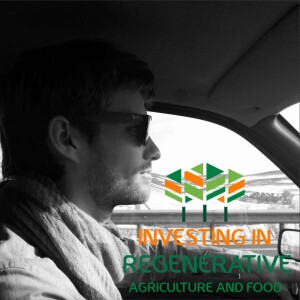
Investing in Regenerative Agriculture and Food
Business:Investing

42 Armin Steuernagel, how to keep your mission driven company independent and raise capital
 2018-11-14
2018-11-14
Download
Right click and do "save link as"
Who has the real power in your regenerative company? Money? Family? Or Purpose? Did you dare to ask the power question?
Welcome to Investing in Regenerative Agriculture. Where I interview key players in the field of regenerative agriculture, people who are scaling up the sector by bringing in new money or scaling up the practises on the ground.
If this content has been of value to you and you have the means, please support me by becoming part of my Patreon community: www.patreon.com/regenerativeagriculture
Other ways to support my work:
- Share the podcast
- Give a 5-star rating (if you podcast app allows it)
- Or buy me a coffee… or a meal! www.Ko-fi.com/regenerativeagriculture
This time interviewed Armin Steuernagel, entrepreneur in food, co-founder of the Purpose Network and impact investor. The Purpose Network helps companies to stay independent and mission driven for the long term. They believe that by innovating the way companies are owned, financed and governed, companies become more successful in the long run and can benefit all of society. Steward-owned companies make a legally binding commitment to their employees and customers: that the company is not a speculative good or commodity but a group of people working for a purpose.
More information:
https://purpose-economy.org/en/
http://purpose.capital/en/
The company Armin co-founded in organic food for children
http://en.mogli.de/about-us/our-story/
Main steward owned principles:
- Self governance isn’t tradable, steering wheel is always hold in trust by stewards of the company
- Purpose, the company has a clear purpose
How to achieve the Mission lock?
- Golden Share, veto share etc.
Examples:
https://www.ecosia.org/
https://www.organicgrown.com/
https://www.bosch.com/our-company/
https://en.wikipedia.org/wiki/Purpose_trust
Logona sold recently to L’Oreal:
https://www.logona.de/en/
Another example of an evergreen fund:
https://www.triodos-im.com/funds/triodos-organic-growth-fund
Thoughts:
- We are working on Alternative buy out capital
- Steward ownership fosters intrinsic motivation
- We are getting into time where it is important for your brand how you are owned
- Normally you invest and you get power, but not in this case
- Closed end fund structures is one of the reasons why we are selling companies again and again and again
- So many impact investors go in and measure and make sure there is an impact, but then they go out and then what?
- Ask the power question: who owns the steering wheel? Can you buy it or can you inherit it? Or do you have another principal, where ability and values decide if you can steer the company
If Armin could change one thing in the food and agriculture space he would change land can only be by people in trust, by stewards and doesn’t become a speculative commodity. Plus designing ownership structures for food and agriculture to make this easier.
Previous podcasts on Land Ownership:
With Thomas Rippel on land ownership:
https://soundcloud.com/investinginregenerativeagriculture/interview-thomas-rippel
Ian McSweeney of the Agrarian Trust:
https://soundcloud.com/investinginregenerativeagriculture/interview-ian-mcsweeney
If you want to receive an email when I upload a new episode, subscribe here eepurl.com/cxU33P
The above references an opinion and is for information and educational purposes only. It is not intended to be investment advice. Seek a duly licensed professional for investment advice.
view more
More Episodes
012345678910111213141516171819
Create your
podcast in
minutes
- Full-featured podcast site
- Unlimited storage and bandwidth
- Comprehensive podcast stats
- Distribute to Apple Podcasts, Spotify, and more
- Make money with your podcast
It is Free
- Privacy Policy
- Cookie Policy
- Terms of Use
- Consent Preferences
- Copyright © 2015-2024 Podbean.com





